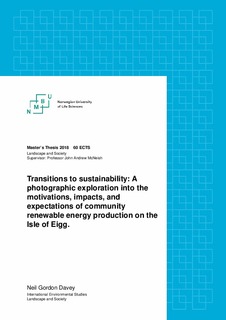| dc.description.abstract | Island communities around the world have long had to deal with issues that many mainland communities are beginning to face. European small islands face many of the same challenges as islands in the Asia-Pacific or Caribbean regions. They are vulnerable to climate events such as extreme weather, they often lack infrastructure, and many have declining populations. This means they need to implement smart solutions in areas such as energy production, waste and water management, employment, and community and cultural preservation. Small European islands that have developed pioneering approaches to the above issues include Ouessant, Seine, and Molene in France, Utsira in Norway, Tilos in Greece, Vormsi in Estonia, and the Isle of Eigg off the west coast of Scotland. These islands’ approaches include the use of autonomous renewable energy systems, energy storage, IT solutions, sustainable entrepreneurial practices and innovative conservation management. An example of sustainable energy production can be found on the Isle of Eigg. Eigg is a community owned island that combines wind, solar, and hydro power to generate enough electricity for its forty households. Some homes have micro-hydro plants, and evacuated tubes on their roofs to heat water, but many residents rely solely on the grid for 24 hour-a-day electricity for the first time in the island’s history. Until the grid was switched on in February 2008, most islanders struggled with unreliable diesel generators. This in-depth qualitative study employs visual data collection methods and photo-elicitation to gather narratives and explore the motivations, impacts, and expectations of using the system. Eigg’s isolation, as well as a strong community will to preserve its culture, heritage, and environment has led to the island's innovative energy management practices. Such practices can empower and revive island communities and highlight what appears to be a relatively simple transition to more sustainable, but nonetheless modern ways of living. These practices also identify islands such as Eigg as notable leaders in small-scale sustainable management techniques, which promote ecologically and socially viable options for a low carbon future. | nb_NO |

